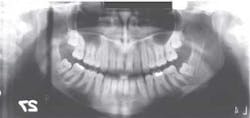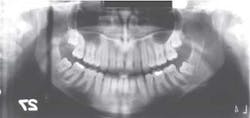Ask Emily: Why patients forgo X-rays, why you should stir the pot on infection control, and how dental hygiene school is a lot harder than anticipated
By Emily Boge, RDH
September 26, 2013
Dear Emily,
Several of my patients have been asking to forgo X-rays over the course of the last couple years. I understand that they do not want the additional expense, but how do I help them understand that X-rays are needed for the best possible dental assessment and exam?
-Skylar
Dear Skylar,
I understand the X-ray refusal conversation all too well. My best advice to you is never to assume that the reason for X-ray refusal is financial.
Adoption of digital X-ray: Apprehension replaced by appreciation
A popular television host (who shall remain nameless), along with other media outlets have been running dental X-rays through the mill lately. I will give you a sample of the conversation I have with my patients on this subject:
Emily: The doctor has requested that I take a few necessary X-rays to complete your dental assessment and exam today. Is it okay if I take them first?
Patient: I don’t think I really want you to take them today.
Emily: Can you tell me more about that?
Patient: I heard on TV that dentists take them a lot more than they need to, and I don’t want any more radiation than I need.
Emily: Well, we take digital dental X-rays only when we need them. Without X-rays, we will not be able to give you the best care available today.
Patient: Okay, go ahead and take them (or) I understand that, but I still do not want them.
Emily: Okay. I understand your decision. Let me go get the tablet with the liability e-form for you to sign releasing the doctor and me from the liability. If it is okay with you, I will plan to have this conversation with you again at your next routine care visit. My job is to always look out for your best interest as my patient.
X-ray haters are a fact of life in dentistry. Some of my colleagues have told me that if a patient refuses X-rays, the doctor prefers to release them from the practice. I understand this choice, though I do not agree with it. Regardless of what protocol the office has on X-ray refusal, it is imperative that there be a set standard in writing for how to handle these patients. I encourage you to devise and follow whatever protocol your team decides, and get it in writing!
Dear Emily,
I started at a new office, and I am embarrassed to say that several of those I work with do not wear masks and glasses sometimes when working with patients – including the doctor. Since I am new I do not want to stir the pot right away, but it really grosses me out.
-Crystal
Dear Crystal,
Infection control is essential in our profession. In my experience, I have seen offices where infection control gets unintentionally relaxed over time. Sometimes people just need a simple reminder of what “we” should be doing and why “we” should be doing it. Do you have team meetings or lunches? If so, you could offer to put together a short lunch-and-learn. If you’re shy, dental companies have salespeople who love to discuss the reason for these protocols. If you choose to present the lunch-and-learn, here is the CDC site I love to use in reference to this topic. The CDC provides basic explanations of what the rules are and how they work. And it is good to remind coworkers that in light of recent breaches in infection control, the public is making an effort to learn more about the standard of care for infection control in dental offices. Also, you could come up with a gentle reminder in your office such as, if the doctor forgets to put a mask or glasses on when he or she comes in for the exam, simply handing them one behind the chair where the patient cannot see. Remember, the actions of one team member can affect the perception that the patient has in the office as a whole, so saying nothing will only lead to more problems down the road.
Dear Emily,
I am in week three of dental hygiene school, and I am feeling very overwhelmed. There are so many quizzes and tests each week, and I never expected it to be this hard! Do things get any easier? I have always wanted to be a dental hygienist, and I know I will be good at it once I graduate. Do you have any advice or words of encouragement?
-Livia
Stronger together: Teamwork in the dental hygiene program
Dear Livia,
I remember the feeling you describe all too well. The first month of dental hygiene school can be scary. Things move very quickly, and a lot of information is thrown in your direction all at once. I am unsure if you want time-management advice, words of wisdom, or just a big hug – but I am here for all three and more!
How to stay on top of your game as a dental hygiene student
My first piece of advice is to streamline. Remove from your life any unnecessary calendar item. Inform your friends and family that it is necessary that your coursework take top priority over the next two (or three or four) years. It sounds silly, but those who are close to you need to know that you are making a commitment to your education. Secondly, rid your life of time wasters like TV and cell phone games. Carry notes with you to places you usually have extra study time like to doctors’ appointments and the Laundromat. Take advantage of extra study minutes here and there.
Plan your study time wisely, studying the most difficult topics first, then the easier ones, coming back to the difficult ones later on if necessary. If you have questions – ASK THEM! Your instructors are there to help you succeed, but they cannot help you unless they know you want it. Also, it helped me to come up with a mantra. The one I am currently using as I finish my master’s program is: “Will this matter a year from now?” Another one I had in hygiene school that I loved is: “If it is not perfect, the world will not end.”
In closing, I offer the support and guidance from the thousands of dental hygienists across the country online through magazines, blogs, and web-based social media outlets. We have all been there, and I have never met a hygienist who was not empathetic to being a dental hygiene student. If this is your dream, never let anything prevent you from achieving it!
-Emily
---
Resident hygiene expert Emily Boge answers your toughest questions on professional relationships with instructors, employers, and patients, what to use and know in the clinical setting, and how to successfully make the transition from student to professional. Send your questions to [email protected], and you may see it in next month’s column!
More "Ask Emily" columns:
Ask Emily: Treating kids, using napkin chains, and paying for your own uniform
Ask Emily: Assisting while employed as a hygienist, liability insurance, working interviews
Ask Emily: Dental implants, patient confirmation, and alternative cavity detection




